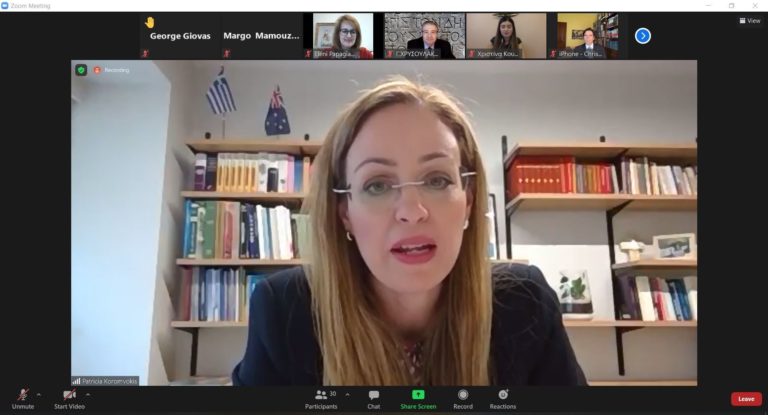Participants from Australia and Greece shared first-hand accounts of Greek language learning and benefits experienced, in an online conversation co-organised by the Macquarie University Greek Studies Program and the University’s Greek Association (MUGA).
Titled ‘Pathway stories in careers through Greek language’ the event was held last week ahead of the International Greek Language Day commemorated annually on 9 February.
Both current students and graduates joined in the event, featuring an extensive list of guest speakers, including the Greek Ministry of Foreign Affairs Secretary General John Chrysoulakis, the Consul General of Greece in Sydney Christos Karras and THI Australia’s representative George Giovas.
Macquarie University was represented by Associate Dean of the Faculty of Arts at Macquarie University Professor Panos Vlachopoulos, the Greek Studies Foundation President Theofilus Premetis, and Head of Macquarie University’s Modern Greek Studies Program Dr Patricia Koromvokis.

Among the attendees were also educators across Sydney’s institutions and tertiary Greek Student Associations’ delegates.
Moderator Dr Koromvokis, set the tone of the discussion stating the goal was “not to promote the indisputable value of the Greek language but to answer tangible and crucial questions.”
Taking from there, Mr Chrysoulakis spoke about Greek language “as a piece of the bigger picture reflecting what Greece is today.”
Commenting on the functionality of Modern Greek studies, he said they facilitate the developing of skills required “in any job ad for any sort of employment”.
“I urge you to share with others the knowledge you have acquired during your studies because our modern world needs the Greek language and the Greek way of thinking,” Mr Chrysoulakis said addressing students.
Beyond career-related benefits, Greece’s Consul General in Sydney, Christos Karras, referred to the language as “a way of thinking and a vision of life.”
READ MORE: Ode to the Greek language in Australian Parliament [VIDEO]
“The Greek language is the mother of universal values that give meaning to our existence and has added to the world words and concepts such as democracy, dialogue, philosophy, mathematics, architecture, theater. Greek language helps a deeper understanding of many other languages that have been influenced by Greek.”
Mr Karras reiterated the Consulate’s commitment to act as in-between with Greek authorities in all relevant issues, while THI’s George Giovas, outlined two of the organisation’s initiatives engaging youth both in Greece and Australia.
One of them is an intensive program offering Greek university graduates work experience opportunities Down Under. Running for up to six months, the program provides paid employment to participants and adequate support.
The aim is to prepare their return to Greece in a capacity in which they will be able to contribute to the country’s economic recovery.
A second undertaking run by the Hellenic Initiative Australia invites students from Australia to join in voluntary philanthropy projects in support of Greece.
Greek language & Career opportunities
Macquarie University’s Professor Panos Vlachopoulos dedicated the biggest part of his speech to career pathways open to Faculty of Arts and Modern Greek Studies graduates.
Prof. Vlahopoulos also covered the importance of creating connections between the Greek studies and diverse scientific fields and professional sectors beyond the language component.
His claims were echoed by a number of Macquarie University graduates who gave positive feedback on the actual experience of studying Modern Greek at a tertiary level, which added a valuable asset in their qualifications’ lists.
Amongst those who took the stand was Faculty of Arts graduate Christina Koutsopoulou, who has been working as a Greek language and English teacher for the last three years in Sydney schools.
“Modern Greek language studies not only helped me in my career trajectory; they also took me places,” Ms Koutsopoulou said.
Forging lifelong friendships and venturing to Greece for a study tour was some of the gains she cherishes.
Socialising benefits were also touched on by Spilios Giovas, President of the University’s Greek Association (MUGA)
“To anyone willing to learn the Greek language, I’d say go for it. It might not be the easiest, but by all means it’s worth the trouble,” Mr Giovas said.
